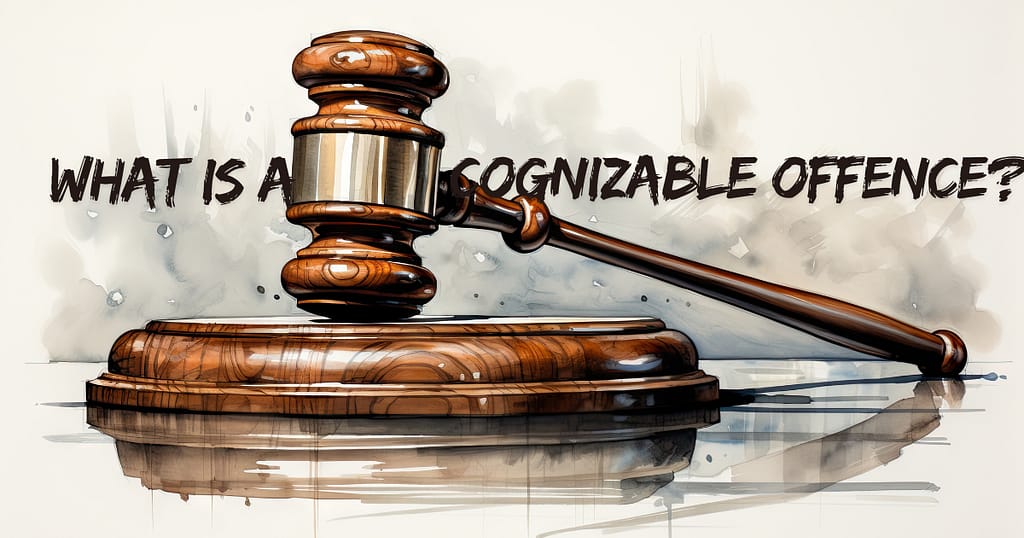- June 8, 2024
- NGO Partner
- 0 Comments
- 225 Views
- 0 Likes
- Marketing Company Blogs
Cognizable Offence
Criminal law is a complex web of statutes and provisions designed to maintain social order and protect individual rights within a society. At the heart of this legal framework lies the distinction between cognizable and non-cognizable offences, a fundamental concept that shapes the administration of justice. In this article, we delve into the concept of cognizable offences, exploring their definition, significance, and implications within the realm of criminal law.
What is a cognizable offence?
A cognizable offense is a serious crime where the police have significant power to act. Unlike lesser offenses, police can arrest you for a cognizable crime without a warrant if they have enough evidence. They can also begin investigating the case right away, without needing permission from a court. This applies to crimes that threaten public safety or well-being, such as theft, assault, or rioting. It’s important to note that the specific list of cognizable offenses can vary depending on your location.

What is an example of a cognizable crime?
Cognizable offences encompass a wide range of criminal activities, including but not limited to:
- Serious Crimes: Offences such as murder, rape, robbery, and dacoity are classified as cognizable due to their grave nature and potential impact on society.
- Public Order Offences: Acts that disrupt public order, such as rioting, unlawful assembly, and promoting enmity between different groups, are considered cognizable to enable swift action by law enforcement authorities.
- White-Collar Crimes: Certain financial crimes, such as fraud, forgery, and embezzlement, may also fall under the category of cognizable offences, particularly when they involve large sums of money or have widespread implications.
- Offences Against the State: Acts that threaten the integrity of the state or its institutions, such as sedition, treason, or espionage, are treated as cognizable offences to safeguard national security interests.
What is cognizance and non-cognizable Offence?
“Cognizance” refers to the legal authority of a court or a magistrate to hear and adjudicate upon a matter. In the context of criminal law, when a court takes cognizance of an offence, it means that the court recognizes the alleged offence and initiates legal proceedings against the accused.
Where as a “cognizable offence” is one for which a police officer has the authority to make an arrest without a warrant and to initiate an investigation without the need for a court order. These offences are typically more serious in nature and may include crimes such as murder, rape, robbery, and certain financial crimes. The police have broad powers to take immediate action to prevent further harm or danger to the public.
Legal Procedures and Safeguards For Individuals
While cognizable offences grant the police broad powers to investigate and arrest suspects without a warrant, it is essential to uphold procedural safeguards and ensure the protection of individual rights. The Criminal Procedure Code (CrPC) lays down specific guidelines governing the arrest, detention, and interrogation of individuals accused of cognizable offences, including the requirement to inform the accused of the grounds of arrest, the right to legal representation, and the prohibition of torture or coercion during interrogation.
The role of the judiciary remains crucial in safeguarding against abuse of power and ensuring accountability in the investigation and prosecution of cognizable offences. Courts play a vital role in scrutinizing the legality of arrests, evaluating evidence, and delivering impartial judgments based on the principles of due process and fair trial.
A cognizable offence is a serious criminal offence for which a police officer has the authority to make an arrest without a warrant and to initiate an investigation without court permission. Examples include murder, rape, robbery, and other crimes that pose a significant threat to public safety or individual rights.
Cognizance refers to a court’s recognition and initiation of legal proceedings against an alleged offence. Non-cognizable offences are less serious crimes for which police cannot make arrests without a warrant and require court permission to investigate. Examples include minor assaults, defamation, and certain types of fraud.




Leave a Comment